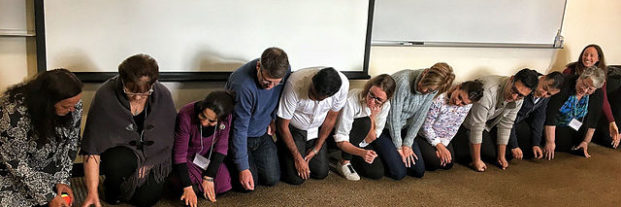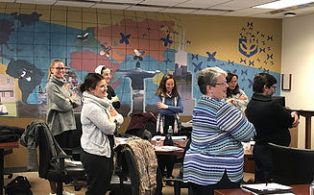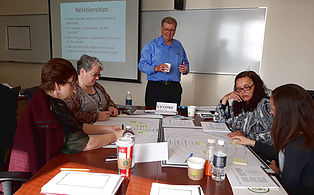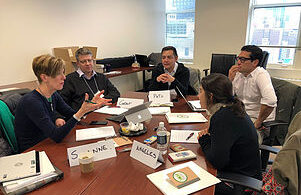

As the 2018 IGH Leadership Program approached, I imagined what it would be like. I anticipated meeting the cohort, who traveled from all over the world, and learning about their endeavors in homelessness. I looked forward to meeting the leaders in homelessness who would be presenting ideas and sharing insight throughout the week. I began to read about the previous convening held in spring 2016.
This was not only my first IGH event but also my first hands-on job training in the United States, as an Atlas Corps fellow focusing on project management. The weeklong event encouraged me to reflect upon how I could apply what I learned to my efforts toward change in my country, Malawi. How could I latch onto community work?
One of my tasks during the program was to share the ideas of the presenters on our social media outlets, and as I did so I began to think about what change is, and how it feels when it is happening, both to leadership and to the people they are trying to lead. Although change can be uncomfortable, it is essential to setting and achieving goals. In order for us to progress toward ending homelessness, we must learn to get comfortable with the discomfort that change often produces in us. Sometimes this change is minor, but sometimes it requires reevaluating whole systems; we must be flexible and willing to confront the status quo if we’re going to make real headway.
In some ways, it is helpful to think of change like a muscle: it can be painful or sore when we exercise it, but that discomfort is proof that the muscle is growing stronger.
During each session, participants worked with one another to share knowledge of their programs and practices, in order to see whether they could help one another fill gaps. (To carry forward the muscle metaphor: participants acted as spotters for one another as they did the heavy lifting of turning a critical eye to their own work.) Speakers with diverse and exceptional expertise in homelessness, consultants, and academic made learning more and interactive; the program felt less like a classroom and more like a collaboration, where participants were as much a part of the teaching structure as the speakers.
To give you a glimpse of the bigger picture, here are some key takeaways:
Principle of Leadership
During this session, participants were challenged to take leading roles in ending homelessness in their communities. Cities joined together to think through how they could use current projects and initiatives to challenge and disrupt systems for more and greater impact in their work.
“Take a moment and think about how sometimes systems become a hindrance to progress in our work, and let’s come up with approaches to change together,” said Pat McArdle, CEO of the Mayday Trust.

Leading Through Change
Dame Louise Casey reminded participants that change is a process, and ought to be part of a strategy – change is not about throwing pasta at a wall to see what sticks, it’s about targeted, smart adjustments to the system as it operates now. Dame Casey empowered participants to avoid letting their fear of failing delay their plan of action toward their goals. In addition, she encouraged the group to let best practices and an optimistic attitude guide their work. Participants wrestled with questions around how to work better with stakeholders that may be outside the “obvious” partnerships for greater impact and how to bring diverse groups to the table, despite barriers that might seem insurmountable. In an increasingly global world, for example, how can cities engage with individuals on their streets who may not speak the native language?
Tools for Leadership

Change is a mindset as much as it is a reaction, and it is the job of those in leadership positions to harness the change mindset in order to produce the change reaction. How do leaders leverage communication and interpersonal skills in order to accomplish this? Jill Stewart, from Stewart Communications Ltd., heightened the discussion on effective communication with the participants during this session. Stewart introduced skills to equip participants to respond to changing complexities while working with diverse groups, like determine ways to communicate with everybody on your team in a way that works for both the team member and the team leader.
Effectively Using Resources and Data
Kimberly Schmitt of All Chicago discussed significance of data collection in the homelessness sector. One thing that the participants kept coming back to is that change is often “behind the scenes,” and it can be difficult for the public to understand how much goes into each initiative. Providing transparent, accurate data is one way to combat this disconnect – as well as being a vital tool in the everyday work that cities and the organizations within them do. Schmitt expanded on the Homeless Management Information System (HMIS) and its evident impact on the work on reducing homelessness in Chicago.
So is this all for the program leaders? Definitely not. Soon we will start featuring participants from 2016 and 2018 programs to share success stories in their work in ending homelessness across the globe, provide insights on how they are applying skills and knowledge gained from the programs. Look out for this exciting journey with our leaders to learn how they are ending homelessness around the world as we take off and grow together!
Participants Feedback During the Program
Susanne Millar,
Glasgow City Health and Social Care Partnership – Glasgow, Scotland
“One of the lessons I’ve learned is using the phrase ‘I don’t know’ is very powerful in allowing yourself to be vulnerable while leading, rather than presenting yourself as a heroic leader.”
Chris Barton,
Catholic Family & Community Services (CFCS) – Paterson, New Jersey, U.S
“A great platform for learning skills and engagement that needs to be further strengthened with participants’ engagement and communication after the program room.”
Grant Campbell,
Glasgow City Mission – Glasgow, Scotland
“I think there are two important aspects of leadership: direct leadership within my own organization and informal leadership when engaging with my partners.”
